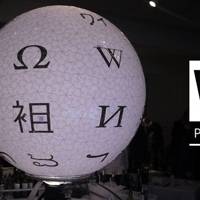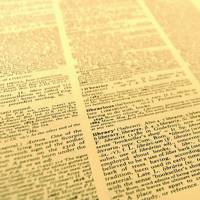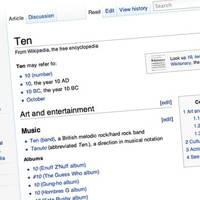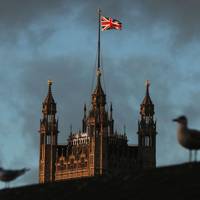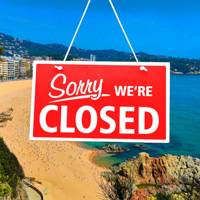As Wikipedia reaches its 10th birthday, Wired.co.uk reflects on a period of time in its early years when Wikipedia was considering taking advertising. This was a contributing factor to the departure of the entire team of Spanish Wikipedia, which jumped ship in 2002 to set up its own collaborative encyclopaedia, Enciclopedia Libre Universal.
Imagine a world in which every single person on the planet is given free access to the sum of all human knowledge, brought to you by Coca-Cola. Imagine a Wikipedia with Larry Sanger calling the shots as chief editor, with a dot-com domain and overseen by a commercial enterprise instead of a foundation. In 2002, Wikipedia could have gone in many directions, including one such as this. Many features that define today's Wikipedia had to be fought for, and by people mostly overlooked in Wikipedia's mythology.
Edgar Enyedy is one such individual. He was involved in the Spanish Wikipedia from its launch on 20 May, 2001, until mid-February 2002, when he abruptly left the project. Together with the rest of the Spanish Wikipedia community, they took the content they had written to another server, gave it a different name and carried on in a different direction. In software culture, this practice is known as "forking" and the following interview with Enyedy brings the fork of 2002 back to life. The purpose is not such much to settle old scores (although there is a bit of that), but to provide some details on an event that significantly reshaped Wikipedia and what it would become.
Here is an extract from an interview that took place with Edgar Enyedy in January 2011:
What was the Spanish Wikipedia like in those first few months?Read next
Edgar Enyedy: There were about 20-25 regular collaborators who worked every day, editing, reverting vandalism, watching articles and writing new ones. On top of that, there were 30 or so more who visited once or twice a week, but also worked hard to contribute to the project. Apart from the typical contributions, my role was to communicate with the emerging international community.
There were a lot of open questions about how the emerging encyclopaedias would relate to each other and in particular the English language original, including exactly how they would differ and where they would overlap. How did that play out with the Spanish Wikipedia?
EE: Even after the basic design was set up, there was still an obvious English presence on the Spanish Wikipedia. You might have found Spanish pages in both Spanish and English, even in the same paragraph or sentence. The software, for example, was not translated at all and it cast an English (language) shadow over the entire project.
Since the American Wikipedia began from scratch, I thought we should do just the same. The Spanish encyclopaedia could not be a
mere translation of English articles. The organisation of topics, for example, is not the same across languages, cultures and education systems. Historiography is also obviously not the same.
We are used to our own history schemes and the American one didn't fit at all. Basically, it became very clear that the American template would not fit the Spanish project.Read next
From the early discussion lists (archived on osdir), it seems like Sanger very much acted like the leader or at least "facilitator" of the entire Wikipedia project. Is this how he was generally received by the Spanish Wikipedia?
EE: Larry Sanger acted as a Big Brother. He was an employee, a Bomis-Wales wage-earning worker. I can't stress this enough. Nupedia's failure left him spare time and he was allocated by Wales to Wikipedia. I really regard him as a co-founder of Wikipedia, even though this fact has become less visible over the years. There were two people heading the project, and it was difficult to tell where the ideas came from.
The American Wikipedia might have seen him as a "facilitator", but we regarded Sanger more like an obstacle. I have to admit that he brought some good ideas to us, but the American Wiki was too caught up in the interests of Bomis Inc.
The clash that lead to your departure from Wikipedia, was sparked by a seemingly insignificant remark, made by Sanger in passing about the possibility of incorporating advertising in order to fund his future work on the encyclopaedia(s). His exact words were "Bomis might well start selling ads on Wikipedia sometime within the next few months". Can you revisit this event and tell us how it unfolded?
The possibility of advertising was out of the question. I asked Wales for a public commitment that there would be no advertising, but this only came after we left.
Apart from those already mentioned (Sanger's role and the autonomy of the Spanish version) there were other points of disagreement.
Firstly, all Wikipedia domains (.com, .org, .net) were owned by Wales. I asked myself "why are we working for a dot com?" I asked for Wikipedia to be changed to a dot org.Read next
There were also significant software issues. The latest software releases and revisions were only installed and running on the Amercian Wikipedia. The Polish Wikipedia, for example, could hardly develop at that time due to problems dealing with special Polish characters. All of the international Wikipedias were running out-of-date software and because Bomis Inc. controlled the wiki farm, we couldn't do anything about it. I asked for access to the farm (just the Spanish server), but after a short discussion my request was denied.
Wales had stated his future intentions of making hard copies from the encyclopaedia(s), noting that it was permitted under the GNU/FDL license. It clearly was part of the license and I agreed with the idea. I told him, however, that the organisation that initiated such a project would necessarily be a foundation, and not just one, but rather a foundation in each and every country. I saw the project as completely non-profit and thought our goal shouldn't be to figure out how to pay wages. Wales always replied that a foundation was very difficult to set up. I told him it was an easy deal: you are contributing to the project with the servers, we are giving our time and effort in an altruistic way, but no-one is going to make money from the project unless it is proven that the money goes to people who really need it -- and that doesn't include staff members.
When I asked Wales through private emails to set up something -- to set up the Basque Wikipedia, for example -- he always replied: "I'm not a wealthy man". I heard that many times. A couple of years back he said in an interview, "I don't care about money".[1] When I think about this position and those exchanges, it makes me laugh. Wikipedia has created a large foundation of wage-earners, and each year he has to ask for ever-increasing amounts of money. This is what I didn't want to happen: a large, money-centred organisation made possible by the free work of the community.
Because of these things, I didn't trust Wales' intentions. Not at all. We were all working for free in a dot com with no access to the servers, no mirrors, no software updates, no downloadable database, and no way to set up the wiki itself. Finally, came the possibility of incorporating advertising, so we left. It couldn't be any other way.
I would like to remark upon the fact that as it is known today, the International Wikipedia that you all know and have come to take for granted, might have been impossible without the Spanish fork. Wales was worried that other foreign communities would follow our fork. He learnt from us what to do and what not to do in future.
During the discussions about leaving and forking, you were very active, but you also note that others shared your opinions. Were you leading the revolt (as it is written on the EL entry on the English Wikipedia), or were there other influential/respected people with significant roles?
EE: You could say that I was some sort of unofficial leader together with Javier de la Cueva, and yes, others shared our opinions. Sadly, there weren't other influential and respected people with significant roles. Many remained anonymous. I did, however, receive a lot of support from the community. Some offered money, others offered help with hosting and securing a domain. It was Juan Antonio Ruiz Rivas who organised hosting with the University of Seville, as that is where he worked.
I recognised that people wanted to make suggestions, to debate and be heard. But those kinds of processes can be lengthy, so I made the decisions. I thought the timing was critical -- a line had been crossed and I didn't want it to be a never-ending story.
Luckily, the community supported me. This was the extent of the unofficial leadership: I made a decision and others supported it.
Was it easy to fork the project?
EE: I remember after I wrote "Good luck with your wikiPAIDia",[2] I started receiving messages like: And now?
What's next? At that time, to set up a wiki and to export the .tar database from Wikipedia was almost impossible. The GNU/FDL license granted it could be done; it made it legally possible. But no way!
The Wikipedia page on Sourceforge had instructions that read like hieroglyphics. And once again due to "technical" reasons (that none of us believed), the downloadable database was never updated. There were also many things to work out regarding choice of domain, hosting, software configuration and transferral of content, which we ended up doing manually.
Our actions made Wales realise how the whole project could be hosted on non-profit servers all over the world. Others could follow in our path, so he had to change things quickly on the American and International Wikipedias.
Once the fork -- entitled the Enciclopedia Libre Universal (EL) -- was set up, how did it differ from the Spanish Wikipedia?
EE: We had realised that a lot of content on the internet was the same, maybe slightly changed, but practically the same info across different sites on a chosen topic. If you wanted to find out about a particular museum, for example, the info you received from Wikipedia was just the same as you would get on the official page of the museum itself, slightly converted, and reworked, like (bad) school homework. We wanted quality over quantity, and original articles, not carbon copy.
This is one of the many things I criticise today: Wikipedia has led us to a verbatim information internet. There used to be a lot of different sources, but nowadays the info you get is carbon copy all over the net. There aren't enough filters. A lot of pages are just circulating Wikipedia texts, including its rights and wrongs, but without its disclaimers.
While it would be easy to look at the numbers and conclude that in the long run the EL failed, I think it is clear that the fork had a significant impact on the direction of the entire Wikipedia project. As you have stated, after the Spanish editors left, Wikipedia decided not to have ads; it changed its domain to dot org; it upgraded a lot of the software; and it set up the Foundation to oversee the project.
EE: Right. The fork had its time and place, its goal and its consequences. Nowadays, the romantic point of view is that EL survived and is still going strong. It is a nice view, but wrong.
EL has failed as a long-term project for one reason: The project itself was not intended to last. It was merely a form of pressure.
Some of the goals were achieved, not all of them, but it was worth the cost.
What do you think of Wikipedia today?
EE: Today, Wikipedia has become a huge, hierarchical social network, behind an unreliable knowledge repository. That's what it is, merely an unreliable repository. As the project continues to grow, so does Wales' celebrity status, but the same cannot be said about the quality of the project, which is being left behind. Wikipedia has reduced the minimal requirements of knowledge to below average in both quality and reliability.
The rise of fundraising campaigns also shows what Wikipedia is not: free. During the 2010 campaign, Wikipedia received $16 million in donations. It is often said that Wikipedia competes with the Googles and Facebooks of the net on a fraction of the budget, but Wikipedia never had to play this game at all.
Would you do anything to change Wikipedia?
EE: Wikipedia is working well the way it is. It is what Wikipedians want it to be. There are a lot of people involved in carrying on the project and this is what they have chosen. It's not my kind of project, not my social network,[3] so I'm not a user. I dislike Facebook, Twitter and Wikipedia policies, so I stay away from them. There is a lot of work to be done to change Wikipedia, and I guess I am in a minority.
Nathaniel Tkacz is co-founder of the Critical Point of View (CPOV) research initiative and co-editor of a forthcoming book based on this project. The full version of this interview is available at the CPOV blog.
The above text is licensed under a Creative Commons BY-NC-ND 3.0 license.
Wired.co.uk put Enyedy's interview to Larry Sanger. His response was this:
If, in saying that I "acted as a Big Brother," Mr. Enyedy is alluding to the totalitarian controller of Orwell's 1984, I would be seriously offended, if I did not think that the description was simply ridiculous. Anyone who was actually there -- and I don't think Mr. Enyedy spent much time on the English Wikipedia -- knows that I did not pretend to control the proceedings, and that I merely attempted to enforce a few common-sense rules, rules that indeed soon became part and parcel of the Wikipedia community. The only sort of person who could seriously describe my role as an Orwellian "Big Brother" is a radical anarchist, for whom even the slightest possible exercise of authority is outrageous oppression. To be sure, Wikipedia had quite a few of such vocal characters in its early days. The story has not yet been fully told just how they essentially took over with the blessing of Jimmy Wales, and proceeded to prove just how bankrupt their brand of radical anarchism is. In the intervening years, the community inevitably descended from anarchy to mob rule and now, lacking any community tradition of a democratic rule of law (of which Wikipedia's "wikilawyering" is the antithesis), is tilting ever closer to a closed, top-heavy sort of system. You might be able to edit a page, but you might also be instantly banned for your trouble, especially if you do not lick the right boots and tow whatever the party line is of the local self-appointed page commissars. If you merely speak your mind, you're as likely as not to be out on your ear in very short order.
But to give credit where it is due, Mr. Enyedy is correct that the fork of the Spanish Wikipedia might well have been the straw that finally tipped the scales in favor of a 100% ad-free Wikipedia.
For Sanger's full response see the next page.
Wired.co.uk put Enyedy's interview to Jimmy Wales. His response was this:
Sanger was absolutely adamant that Wikipedia must have ads, and it was my refusal to do so that led to Wikipedia being as it is today.
The Spanish fork did not provoke any changes of any kind. We stayed the course. I didn't want to have advertising, and I found ways to avoid it -- the Spanish fork was an important event in the history of Wikipedia, but not in the sense of "provoking change".
Larry Sanger's response in full
The interview shows that Mr. Enyedy holds some quite extreme views, such as that there is something wrong with the Wikimedia Foundation raising a lot of money for "wage earners." This is the sort of person who actually found it offensive that someone was employed to organise the project in the first place, and all the more outrageous that millions of dollars might be spent in wages for WMF employees. To be sure, I might not approve of everything the WMF wage earners are doing, but I see nothing whatsoever with raising money and using the money to pay people wages -- as long as they are really supporting the endeavor in a positive way that could not be done effectively by volunteers. That, I think, is something that an investigative journalist really ought to be reporting on. However that might be, having managed a number of online volunteer projects in the past, I can assure Mr. Enyedy and your readers that there are many important tasks, needed to make an enterprise like Wikipedia a success, which cannot be entrusted to volunteers, because no volunteers can be found to do them. That's just an economic fact that I have repeatedly encountered.
If, in saying that I "acted as a Big Brother," Mr. Enyedy is alluding to the totalitarian controller of Orwell's 1984, I would be seriously offended, if I did not think that the description was simply ridiculous.
Anyone who was actually there -- and I don't think Mr. Enyedy spent much time on the English Wikipedia -- knows that I did not pretend to control the proceedings, and that I merely attempted to enforce a few common-sense rules, rules that indeed soon became part and parcel of the Wikipedia community. The only sort of person who could seriously describe my role as an Orwellian "Big Brother" is a radical anarchist, for whom even the slightest possible exercise of authority is outrageous oppression.
To be sure, Wikipedia had quite a few of such vocal characters in its early days. The story has not yet been fully told just how they essentially took over with the blessing of Jimmy Wales, and proceeded to prove just how bankrupt their brand of radical anarchism is. In the intervening years, the community inevitably descended from anarchy to mob rule and now, lacking any community tradition of a democratic rule of law (of which Wikipedia's "wikilawyering" is the antithesis), is tilting ever closer to a closed, top-heavy sort of system. You might be able to edit a page, but you might also be instantly banned for your trouble, especially if you do not lick the right boots and tow whatever the party line is of the local self-appointed page commissars. If you merely speak your mind, you're as likely as not to be out on your ear in very short order.
But to give credit where it is due, Mr. Enyedy is correct that the fork of the Spanish Wikipedia might well have been the straw that finally tipped the scales in favor of a 100% ad-free Wikipedia.
For my own part, I have been weighing the merits of recommending to the Wikipedia community that they start running Google ads. The arguments against this are looking thin. But there should be a very full audit of operations, and deep soul-searching about what would be done with the gazillions of dollars that would be produced, first. By the way, it was Jimmy Wales' first idea to make Nupedia and later, Wikipedia, a for-profit business; then, when we reflected on the nature of the community that was building our encyclopedia projects, it became clear that we would have to proceed as a non-profit business. Only some time afterwards did we also decided not to sell ads.
I can't expect Wired UK to post another long response from me, this time to Jimmy Wales' comment on page 2. But I've blogged about it, here, giving many salient historical details: http://larrysanger.org/2011/01/jimmy-wales-on-advertisement/ ---
[1] Enyedy is referring a comment made by Wales in the Catalonian newspaper La Vanguardia, January 8<sup>th</sup>, 2009.
[2] This was the last line of Enyedy's reply to Sanger's post about possibly introducing advertising (and partially quoted above). In this reply, Enyedy informed the American Wikipedians that he had left the project.
[3] Enyedy described to me that he sees these kinds of projects as forms of social networks, with the discussion and interaction taking place on things like the 'talk pages' during the creation of articles.
